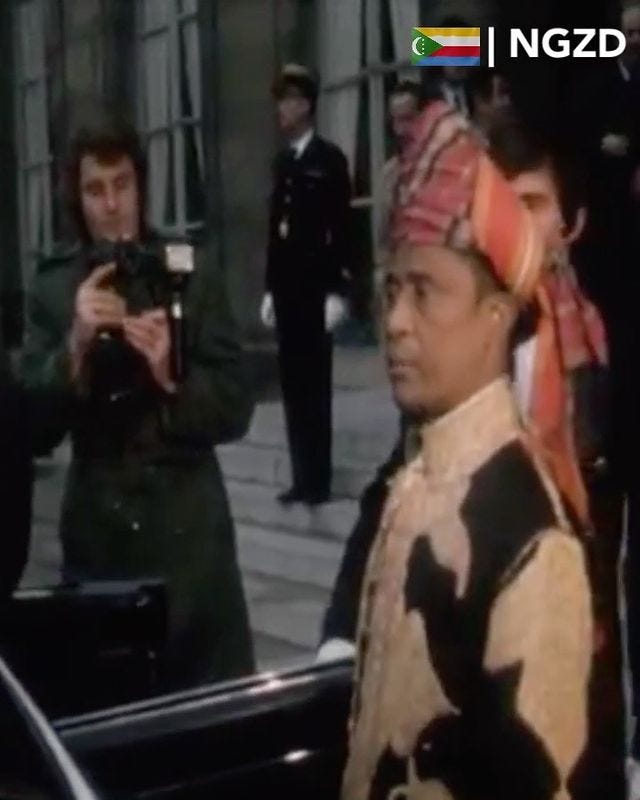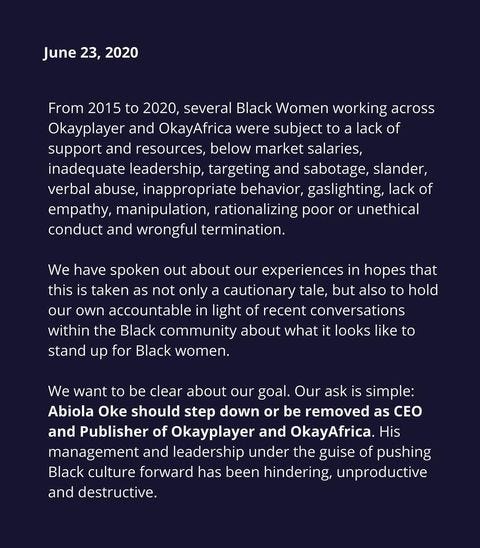Issue No 2: Independence Day
"Black people have exposed, by their very existence, the inadequacies not only of the practice of freedom, but of its very theoretical formulation" - Angela Davis
Today (July 6th) marks 45 years of Comorian independence from French rule - when three of the four islands of Grand Comore (Ngazidja), Moheli (Mwali), Anjouan (Nzwani) and Mayotte (Mahore) successfully parted ways with the notoriously domineering regime of French colonialism.
It came a full 15 years after the wave of what is known as the “Year of Africa” (1960); where 17 African nations declared independence from colonial rule - overwhelmingly from France - including the then-Republic of the Congo from Belgium (marked by Patrice Lumumba’s seminal speech), and punctuated by Ghanaian President Kwame Nkrumah’s address at the United Nations General Assembly:
For years, Africa has been the foot-stool of colonialism and imperialism, exploitation and degradation. From the north to the south, from the east to the west, her sons languished in the chains of slavery and humiliation, and Africa's exploiters and self-appointed controllers of her destiny strode across our land with incredible inhumanity without mercy, without shame, and without honour.
This year was concluded by the ratification of the Declaration on the Granting of Independence to Colonial Countries and Peoples in the United Nations - which, it should be noted, was abstained by the colonial powers of Belgium France, Portugal, Spain, United Kingdom, and the United States.
(We also got the Congolese Rhumba hit “Indépendance Cha Cha.”)
Of course, no fracture comes without its pound of flesh: many of the countries within the Francophonie in particular continued to orbit around the vestiges of the colonial empire. The CFA remained that kept many countries economically tied to France, with their reserves kept in French treasuries, simply rebranding from colonies francaise d’Afrique to communaute financiere africaine in West Africa and Cooperation financiere en Afrique centrale elsewhere. This is a financial bind that is still being unwound to this day - with a proposition pending for a new regional currency, that is still pegged to the Euro and backed by the French Treasury, running at odds with the ongoing ECOWAS efforts (led by Nigeria) to form the Eco currency.
In the case of the Comorian archipelago, after winning our vote for independence (with the key assistance of several under-acknowledged women in the organizing efforts leading up to independence) with 95% of the vote, France rejected the vote and demanded assessment island by island, in which Mayotte was accounted as voting to retain French ties, and used as a just cause for annexation - despite running afoul of the aforementioned UN policy on decolonization. Since then, twenty UN resolutions have condemned France's annexation of Mayotte - including an attempted United Nations Security Council resolution in 1976 recognizing Comorian sovereignty over Mayotte, supported by 11 of the 15 members and vetoed by France, whose permanent seat on the Council is an outgrowth of their colonial reign. Below is a link to a summary video of the road to independence in French for those who can understand:
Since then, Mayotte has become part of the French outre-mer - yet another remnant of the formal colonial era - officially becoming an “overseas” department in 2011, joining the likes of Guadeloupe, French Guiana, Martinique, and Réunion. In the time since, a visa known as the visa Balladur was put in place in 1995 (named after Édouard Balladur, the prime minister of France at the time) requiring clearance for Comorian nationals to enter the 4th island. It has caused fractures and significant loss (emotional and physical) that remain to this day, particularly with generations of Mahorais that are raised with the knowledge of being “French” and consider Comorians outsiders, and the stratification of resources that exist between the two communities. For more insight (in English), please feel free to watch this Al Jazeera special below (although I caution that even this cannot fully capture all the nuances of such a complex matter).
I chose to do the second issue of this newsletter on Comorian Independence Day for a few reasons. The first is, of course, out of pride for my homeland; the second is to impart the key takeaway that historically-supported pathways to freedom are red-herrings that can still come with many caveats, whether it be the trappings of neo-colonialism or seizure of assets. Operating within these constructs is not a route to liberation so much as it is a route to incrementalism, with punitive tactics undertaken in tandem by former overseers (for the sake of brevity, look up Bob Denard).
I think about this a lot in this current moment, as our various communities and organizing groups start to think through what the future we envision for ourselves as Black peoples would start to look like. In Angela Davis’ “Lectures on Liberation” , she said, “one of the most acute paradoxes present in the history of Western society is that while on a philosophical plane freedom has been delineated in the most lofty and sublime fashion, concrete reality has always been permeated with the most brutal forms of unfreedom, of enslavement.”
This is what we are all trying to break free from and reimagine; all forms of enslavement, from neocolonialism to the modern prison industrial complex in the Americas and everything in between. As Angela Davis said during the Dream Defenders’ Sunday School session on June 14th, “Abolition allows us to get to the root of the problem. That is how it is the radical alternative.” K Agebebiyi added, “the prison system aims to redefine who can be human. We know that we are human. Abolition requires me to ask, ‘how can the human in me, see and honor the human in you?’” Derecka Purnell eloquently stated, “it's an invitation to think about the politics and struggle through it together.”
It’s wondrous to see how so many conversations within the diaspora overlap and speak to each other, even accidentally. In a moment when so much ado and handwringing is made about the nature of removing Confederate Statues, venerating slaveholding Founding Fathers, or genocidal explorers who never even touched American soil, I think about the dialogue around the “Rhodes Must Fall” movement - particularly the 2015 remarks given by Achille Mbembe, titled “Decolonizing Knowledge and the Question of the Archive” :
“To bring Rhodes’ statue down is far from erasing history, and nobody should be asking us to be eternally indebted to Rhodes for having “donated” his money and for having bequeathed “his” land to the University. If anything, we should be asking how did he acquire the land in the first instance…But bringing Rhodes’ statue down is one of the many legitimate ways in which we can, today in South Africa, demythologize that history and put it to rest – which is precisely the work memory properly understood is supposed to accomplish. For memory to fulfill this function long after the Truth and Reconciliation paradigm has run out of steam, the demythologizing of certain versions of history must go hand in hand with the demythologizing of whiteness. This is not because whiteness is the same as history. Human history, by definition, is history beyond whiteness. Human history is about the future. Whiteness is about entrapment.”
(It should be noted, of course, that the Rhodes Scholarship has still retained its name).
Of course, this pattern of coalescent discourse is a cyclical behavior that can be seen in all sorts of diasporic thought, whether it be socio-political or purely arts-related (in each instance, it is still creative in spirit). Take, for example, this conversation between Haitian poet Rene Depestre and Martinican writer and co-founder of the Negritude movement Aimé Cesaire during the Cultural Congress of Havana in 1967, transcribed in the seminal text “Discourse on Colonialism”:
A.C.: I remember very well that around that time we read the poems of Langston Hughes and Claude McKay. I knew very well who McKay was because in 1929 or 1930 an anthology of American Negro poetry appeared in Paris. And McKay's novel, Banjo - describing the life of dock workers in Marseilles - was published in 1930. This was really one of the first works in which an author spoke of the Negro and gave him a certain literary dignity. I must say, therefore, that although I was not directly influenced by any American Negroes, at least I felt that the movement in the United States created an atmosphere that was indispensable for a very clear coming to consciousness. During the 1920's and 1930's I came under three main influences, roughly speaking. The first was the French literary influence, through the works of Mallarme, Rimbaud, Lautreamont, and Claudel. The second was Africa. I knew very little about Africa, but I deepened my knowledge through ethnographic studies… and as for the third influence, it was the Negro Renaissance Movement in the United States, which did not influence me directly but still created an atmosphere which allowed me to become conscious of the solidarity of the black world.
He later continues:
I have always recognized that what was happening to my brothers in Algeria and the United States had its repercussions in me. I understood that I could not be indifferent to what was happening in Haiti or Africa. Then, in a way, we slowly came to the idea of a sort of black civilization spread throughout the world. And I have come to the realization that there was a "Negro situation" that existed in different geographical areas, that Africa was also my country. There was the African continent, the Antilles, Haiti; there were Martinicans and Brazilian Negroes, etc. That's what Negritude meant to me.
I can only hope that we recognize the power of this as we continue to conceptualize and dream of the world and spaces we deserve; and lean on each other as an oppressed peoples to help get there.
This month:
For those who are still out in the streets (while your algorithm may have you convinced otherwise, protests are still very much happening): check out resources such as Mask On Zone and resources from Decolonize this Place to continue to engage in organizing and disrupting efforts as safely as possible.
Pop Smoke’s debut posthumous album ‘Shoot for the Stars, Aim for the Moon’ is slated for a premiere at #1 on the Billboard Charts, after a contentious reaction to Virgil Abloh’s initial album cover. I wrote about how his music has become the sound of the youth protest movement in NYC for Nylon. I highly recommend this review of the album in NPR by Briana Younger (excerpt below):
That's the thing about posthumous albums — they're forever framed by the circumstances under which they were released, forever tied to death. They become an exercise in myth-making as much as reminders of what has been lost. To listen to Shoot for the Stars is to wonder where Pop begins and ends, to search for him among his peers and imagine that their chart-topping and history-making ascents would've been his destiny as well. In his absence, we're left only with snapshots of his potential, possibilities refracted through other people's imaginations and suspended now within the span of the album. It could never be enough, but it'll have to do.
If you aren’t already subscribed to Woy Magazine’s weekly newsletter - providing you with news and commentary on Haiti and the Diaspora - you should be. The latest issue covers important information around organizing efforts and protests that have been happening in Haiti that have been facing police violence tactics akin to that in the United States, as well as mass deportation updates.
Black women who were formerly employed at OkayAfrica and OkayPlayer (Antoinette, Oyinkan, Hanan, Ivie, Sinat, Winnie, Olabisi and others) have been making unprecedented waves in Black media for mistreatment at the hands of their CEO and publisher Abiola Oke (who has since relinquished his position), demanding his removal and other amends be implemented at the publication moving forward. Important note: they have not alleged personally to any sexual assault/harassment (while allegations have been revealed as a result of this ongoing story) or requested their jobs back. As someone who has worked with OkayAfrica for some time and was nominated for #Okay100Women this year, hearing the accounts of the mistreatment was unnerving; but I will always stand with, believe, and support trusted Black women voices in media, and hope to see more people do so. Click here to stay up to date with the latest developments and donate to their fund if you can. #itsneverokay
On American Independence Day, I had a conversation with Sophia Gurulé - a Xicana public defender who represents incarcerated immigrants facing deportation - on #FreeOusman, the concept of citizenship and sovereignty, harmful immigrant narratives, the prison-to-deportation pipeline and race and class implications, DACA, ICE, and anything else that came to mind around identity, borders, and the carceral state, and how this all fits with the Movement for Black Lives and in my reporting on police brutality for Black immigrants. Feel free to check that out below (as well as my purple hair).
Assa Traore. That’s all. Her profile is here in Le Monde, and she is in dialogue with Angela Davis here as well (the parts with Angela are in English).

Comorian-American (by way of France) rapper Napoleon Da Legend has a fantastic EP out, Charles de Gaulle, with tracks in both French and English. Give it a listen below:
Malcolm-Aimé Musoni launched the first installment of his Zine, Blacks Rule Vol 1, with the collaboration of a lot of Black creatives (myself included). I did want to explicitly pull out an excerpt of an essay from my friend Mack titled “Kill the Cop in Your Head,” because I think it’s especially potent and resonant for right now - but check the rest out for yourself.


I leave you with three final things: 1) the audio of Lumumba’s Independence Day speech, 2)one of my favorite montage videos of the Comorian National anthem (with French subtitles 3) a lovely playlist from the women at FourTwo Creative. Yes, you can let go and get free. ♥️
Alors, c’est tout!







